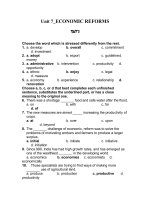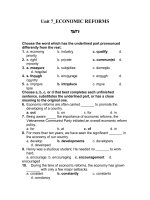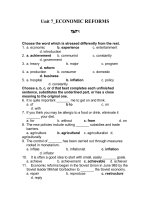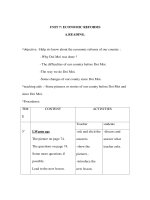37 unit 7 economic reforms
Bạn đang xem bản rút gọn của tài liệu. Xem và tải ngay bản đầy đủ của tài liệu tại đây (559.96 KB, 4 trang )
NGOẠI NGỮ 24H 1
WWW.NGOAINGU24H.VN
UNIT 7: ECONOMIC REFORMS
A. Reading
VOCABULARY
• renovation (n): sự đổi mới
• dominate (v): chi phối, thống trị
• stagnant (adj): trì trệ
• inflation (n): lạm phát
• dissolve (v): giải tán, giải thể
• substantial (adj): thực tế, quan trọng
• government subsidies: sự bao cấp của chính phủ
• government commitment: sự cam kết của chính phủ
Read the passage and do the tasks that follow.
One of the most important measures to be taken to promote the development of a country is to
constantly carry out economic reforms. Being aware of this, in December 1986, at its Sixth National
Congress, the Vietnamese Communist Party initiated an overall economic reform, commonly known
as “Doi Moi” (Renovation). The aim of Doi Moi was to restructure the economy of Vietnam and to
raise the living standards of the people.
Before Doi Moi our country experienced a lot of difficulties: the economy was underdeveloped and was dominated by traditional agriculture; the country was poor, the people led a
poor life, production was stagnant; there was a shortage of schools and hospitals, and inflation
could be seen in every sector of the economy. To solve these problems, our Government
introduced a number of renovation measures: they eliminated government subsidies; they shifted
economic priority from heavy industry to three major economic programmes, namely, production of
food, production of consumer goods and production of exports; they reduced state intervention in
business; they opened trade relations with all countries in the world and encouraged foreign and
domestic private investment.
The subsequent National Congresses of the Vietnamese Communist Party held in 1991, 1996, and
2001 continued to reaffirm its commitment to Doi Moi, and called for more administrative and
economic reforms. Under the Party’s guidelines, the Government adopted the Land Law in 1993 and
the Enterprises Law in 2000. These have laid legal grounds for dissolving inefficient co-operatives,
expanding more opportunities for farmers, and encouraging both domestic and foreign private
investment.
Since Doi Moi, our country has undergone substantial changes: productivity and agricultural
exports have constantly increased, the farmers have enjoyed land use rights and have had greater
choice on how to use their agricultural land, the workers have worked harder as their
time is their money, and the children, particularly those from ethnic minorities have had more
opportunities to enjoy education and training.
We believe that with the strong commitment of our Party and Government to Doi Moi, we will gain
greater achievements and build a better life for our people.
Task 1. Decide whether the statements are true (T) or false (F).
1. Economic reform is the most important measure to be taken to promote the development of a
country.
1
Đăng ký học: 0962 60 8801 – 04 6260 3948
Địa chỉ: Số 18 Trần Đại Nghĩa – Q Hai Bà Trưng – Hà nội
NGOẠI NGỮ 24H 2
WWW.NGOAINGU24H.VN
2. Doi Moi was initiated by the Vietnamese Government in 1986.
3. Before Doi Moi, inflation was present in all branches of the national economy.
4. To make Doi Moi to be successful, the Government shifted only economic priority from heavy
industry to three major economic programmes.
5. The Land Law and the Enterprises Law have encouraged both domestic and foreign private
investment.
Task 2. Answer the following questions.
1. When and by whom was Doi Moi officially initiated?
2. What was the aim of Doi Moi?
3. Name the renovation measures the Government introduced to implement Doi Moi.
4. How has Vietnam changed since Doi Moi?
5. What do we believe?
B. Listening
VOCABULARY
• inhabitant (n): dân cư
• discourage (v): can ngăn >< encourage
• be in ruins (v) = be destroyed: phá hủy
• run short of (v): hết ...
• take measures to do sth: áp dụng biện pháp làm gì.
Task 1. Listen to the passage about the inhabitants of Tango Island and decide whether
the statements are true (T) or false (F).
1. Tango Island is in the South Atlantic.
2. They found a drug.
3. The drug made it difficult for the people to think in a reasonable way.
4. The whole population stopped working because of the drug.
5. The Prime Minister warned the people many times on the radio about the drug.
6. The islanders took the Prime Minister’s advice.
7. The Government introduced laws to make the drug illegal.
8. The Law couldn’t have any effect.
9. The Government exported the drug to another country.
Task 2. Listen again and answer the questions.
1. What did the people of Tango discover?
2. What did they do with the plant?
3. What negative effects did the drug bring about?
4. How many measures did the Government take and what were they?
5. What did the Government of Tango decide to do eventually?
Tape script
The inhabitants of Tango, a small island in the Atlantic Ocean, discovered a plant which contained a
powerful drug. They grew the plant all over the island and they took the drug every day. This made it
more difficult for them to think rationally - it stopped them worrying about the future and enabled
them to relax and enjoy themselves. And because of the drug, the whole population of the island
stopped working and spent all their time singing and looking at the sea.
Unfortunately this had very bad effects on the country’s economy. The workers and farmers became
lazy, the children did not want to go to school and the whole population began to run short of food.
This, however, did not discourage people from taking the drug. The Prime Minister made speeches
on the TV warning them about the drug, but nobody took any notice, and before long the economy of
the country was in ruins.
2
Đăng ký học: 0962 60 8801 – 04 6260 3948
Địa chỉ: Số 18 Trần Đại Nghĩa – Q Hai Bà Trưng – Hà nội
NGOẠI NGỮ 24H 3
WWW.NGOAINGU24H.VN
This forced the Government to take measures. They introduced a law to make the drug illegal. But
that only made the situation worse. The law couldn’t prevent the people from taking the drug. On the
contrary, the fact that the drug was illegal encouraged people to take it more. They put the drugtakers into prison. But this did not have any effect, there were not enough prisons for them.
Eventually, the Government found a solution: they exported the drug to other countries. This saved
the islanders from having to work more than one day a week, and allowed them to spend the rest of
their time sitting in the sun without any care in the world.
C. Speaking
The country of Fantasia started its overall reforms in the early 1970s. The reform has brought
about positive effects in many sectors of the economy, particularly in education, health care
and agriculture.
Suggest what the Government and the people of Fantasia have done to improve their economy in
these sectors. Use the cues below:
Education:
● curriculum and textbooks
● more equipment and facilities
● more schools
● teachers’ salaries
● teaching and learning methods
● more scholarships for poor or disadvantaged students
Health care:
● more hospitals
● doctors’ and nurses’ salaries
● more highly qualified doctors
● sensitivity of doctors and nurses
● more medical equipment and to their professional facilities responsibilities
● health insurance
Agriculture:
● appropriate policies to
● more dykes and dams, encourage farmers to work irrigation and drainage systems
more efficiently
● new and advanced farming
● more advanced farming techniques facilities and equipment
● fertilizers, pesticides, insecticides
D. Writing
The table below presents the achievements the Government and the people of Tango have
gained in some branches of the economy after two decades of their economic reform. Read the
information in the table and do the tasks that follow
3
Đăng ký học: 0962 60 8801 – 04 6260 3948
Địa chỉ: Số 18 Trần Đại Nghĩa – Q Hai Bà Trưng – Hà nội
NGOẠI NGỮ 24H 4
WWW.NGOAINGU24H.VN
Before 1980
1980
1990
2000
Agriculture
- 0.5%
3.5%
4.5%
5.4%
Fishery
- 0.4%
3.2%
4.0%
5.0%
Forestry
- 0.2%
2.7%
3.5%
4.5%
Industry
- 0.6%
2.3%
3.4%
4.5%
Construction
- 0.3%
4.5%
5.3%
6.4%
Export
0%
3.0%
4.1%
5.3%
Answer the following questions.
1. What was the economic situation in Tango before 1980?
2. What can you say about the economic situation in Tango from 1980
to 2000?
3. What do you think the Government and the people of Tango have done to achieve these results?
Sample
The Government and the people of Tango started their overall economic reform in the mid 1970s.
Before that time, the economy of the country was in ruins such as: Agriculture: -0.5%, Fishery: -0.4%,
Forestry: -0.2%, Industry: -0.6%, Construction: -0.3%. Especially people can not see any activities of
export in the country. As a result, the economy was under-developed, the country was poor, the people
led a poor life, and production was stagnant.
To solve the problems, the economic reform was applied in some sectors of the economy. In
agriculture, they introduced new and advanced farming techniques, facilities and equipment as well as
new seeds, fertilizers and pesticides. In fishery, they improved the new advanced methods of fishing
and aquaculture.
At the same time, they promoted the export of seafood. In forestry, the government encouraged people
to plant more forests and woods and conserve them as well. In industry, they shifted economic priority
from heavy industry to economy of production and processing. And to speed this up and promote the
export potentials, they opened trade relations with many other countries.
From the information from the table, we can say that since the economic reform, Tango
country has undergone substantial changes, all branches of economy increased steadily: Export: 5.3%,
rose 2.3% against 1980; Industry: 4.5%, rose 2.2% against 1980; Construction: 6.4%, rose 1.9%
against 1980. As can be seen in the table, construction developed best, before 1980, it was only -0,3%,
but in 2000, it increased to 6,4%.
In short, thanks to the economic reform, the Government and people of Tango will gain greater
achievements and developed miraculously from a poor country to a developing country or a very rich
country
4
Đăng ký học: 0962 60 8801 – 04 6260 3948
Địa chỉ: Số 18 Trần Đại Nghĩa – Q Hai Bà Trưng – Hà nội









